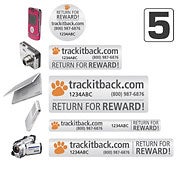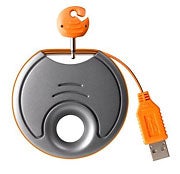How to Stop Laptop Theft
If you run a small business, your biggest IT worry is probably not when or whether to upgrade to Vista; it’s how to keep your valuable equipment–and the even more precious data it contains–out of the hands of thieves.
If you run a small business, your biggest IT worry is probably not when or whether to upgrade to Vista; it’s how to keep your valuable equipment–and the even more precious data it contains–out of the hands of thieves. Laptops and mobile gadgets like cell phones, PDAs, and USB flash drives have become a necessity in many business settings. And such equipment now spends more time than ever outside the office, as employees work at home or in the nearest Starbucks.
That development presents a huge opportunity for loss and theft. Laptop thefts out of parked cars and conference rooms may grab headlines, but a far greater number of devices simply get left behind in places like cabs, subways, and airplanes. YouGetItBack.com reports that La Guardia airport alone has accumulated more than 70,000 unclaimed laptops and PDAs in its lost and found. According to Accenture, 10 to 15 percent of all handheld computers, PDAs, mobile phones, and pagers are eventually lost by their owners.
Laptops have become increasingly attractive targets for identity thieves, too. A 2006 Ponemon Institute study reported an 81 percent increase in the number of companies reporting stolen laptops between 2005 and 2006. Even notebooks that never leave the office can be targets, as many thefts are inside jobs.
Most small businesses can weather the physical loss of a laptop or two, especially if their insurance policy covers the hardware. But the files on the machine may raise more-troubling issues: They can hold trade secrets or financial and customer data; they may not be backed up on a central server; and losing them may trigger embarrassing public reporting requirements under several recent federal and state laws.
According to a 2007 survey by McAfee and Datamonitor, a data breach involving personal customer information could cost a company, on average, $268,000 in reporting expenses–even if the data is never used. And one-third of the companies surveyed said that a major security breach had the potential to put them out of business entirely.
You can take several key steps to protect both your laptops and your data. By adopting these measures, you’ll greatly reduce your risk of losing key hardware and data.
Track Your Laptop With an ID
The first step is to slap an ID tag on each laptop, BlackBerry, digital camera, and USB key your business owns, and record it with a recovery service. An astonishingly large number of businesses never record even the serial numbers of their equipment, police say, making it impossible for authorities to reunite found items with their rightful owners. Tracking tags give you an opportunity to enter serial number information as you tag each item, after which you can use the recovery service as a basic inventory system. (You should definitely maintain serial-number records, as well as purchase receipts, in case of insurance claims.)
Recovery services report recovery rates of 75 percent and higher on tagged items. Evidently, most people who find laptops are honest, and by offering prepaid returns and a reward on the tag (which lists an 800 number), the service makes it easy to do the right thing.
The services have you register each item on the Web, with identifying information; then they contact you to arrange return if an item is found. The price is nominal, usually around $5-$10 per label, with quantity discounts. Vendors that offer labeling and recovery services include ArmorTag, BoomerangIt, StuffBak, TrackItBack, YouGetItBack.com, and zReturn.

Some of these companies sell lifetime service for a fixed price, while others use a yearly subscription model. Some charge a recovery fee if an item is found. TrackItBack sells multipacks, which bring costs down to $5 per label, with lifetime service and no administrative or shipping fees on recovered items. TrackItBack will even send you a free replacement tag if the original comes off.
The recovery firms unanimously cite privacy considerations and their 24-hour phone service as reasons to use their labels instead of just a taped-on business card or an inventory tag from your own company. The labels themselves may deter theft, as they render an item harder to fence. Labels are available for portable projectors, keys, eyeglasses, Bluetooth headsets, GPS devices, luggage, and more–not just laptops and cell phones. Anything that moves can and probably should be protected.
Rely on Recovery Software
If a thief steals your laptop, tracking and recovery software can help you get it back. Absolute Software’s ComputraceComplete ($50 per year), Brigadoon’s PC PhoneHome ($30 lifetime), Inspice’s Inspice Trace ($30/year), XTool’s Laptop Tracker ($40 per year for Small Business Edition) and zTrace Technologies’ zTrace Gold ($50 per year) are tracking utilities that connect periodically to a central server. When any of these does so, the associated service can trace your laptop’s location on the Internet and summon the local police to recover it. Absolute Software claims that Computrace can survive on a laptop even if the thief successfully reinstalls the operating system, reformats the hard drive, or (in some laptop models) swaps out the hard drive.
Some tracking products also have such features as the ability to wipe out key data if a laptop is stolen, or to take a photo of the thief if the machine has a built-in camera. The laptop’s location may be pinpointed by IP address or by GPS, depending on the device and the service. Discounts vary among the services, depending on such variables as features, number of devices covered, and duration of contract, but the overall expense for most businesses pales in comparison to the cost of data loss.
ComputraceComplete is the market leader, with a broad set of features, from asset and software license management (another great tool for small businesses) to a remote data deletion capability that meets Department of Defense standards. The company guarantees recovery of your computer within 30 days; if it fails to produce the lost unit, it will pay you 90 percent of the device’s original purchase price, up to $1000.
Back Up and Encrypt Your Data
Regardless of the precautions you take, a laptop may still get lost or stolen. So it’s vital to keep the loss to a minimum by ensuring that all important data is backed up and encrypted.
Encrypting data on laptops and on USB drives is relatively easy these days, thanks to numerous inexpensive security tools that provide military-grade encryption. But these programs are only as effective as their users allow them to be, so make sure that your business’s employees understand how to take care of their equipment. For instance, instead of letting a laptop sleep during travel, they should shut it down completely, thereby locking the drive.
Employees must also understand which folders are encrypted and how to back up files when out of the office. An online backup/sync service can handle this task very efficiently. Make sure that the one you use demonstrates its routine so you can tell whether it is functioning properly. See for suggestions on selecting a low-cost online backup service.
Educate Your Employees
The human factor in laptop security may be the most important one–and it is certainly the easiest to overlook. Most laptops are accidentally abandoned, not purloined, and even instances of actual theft usually amount to crimes of opportunity. Physical security is the single best way to prevent loss. Unfortunately, persuading employees to guard company property with the same attention and zeal they would devote to their own purse or wallet is a difficult.
Develop a written company policy on safeguarding mobile equipment, and periodically reinforce awareness of the consequences of laptop theft. Employees need to realize that they may lose, along with the laptop, their personal Web passwords and e-mail, any work not backed up, and whatever else they might have stowed in the laptop bag–such as keys, USB flash drives, and company papers. Remind workers about the importance of taking personal responsibility for company property, and review the consequences of noncompliance. Do periodic spot-checks to ensure that people are adhering to company guidelines. And while you’re at it, emphasize the need to use backup and encryption software. In all of these security systems, the user is the weak link.

Advise your notebook users to carry unobtrusive bags that don’t scream “laptop inside.” Messenger bags, knapsacks, and rolling overnighters with inner pockets all make good alternatives to dedicated laptop bags. Finally you may want to recommend that employees who travel a lot use an alarm. The Belkin USB Laptop Security Alarm ($55) function as cable locks but sound an alarm if someone cuts the cable. The Doberman Laptop Defender Portable USB Computer Alarm ($30) incorporates a motion sensor that triggers a loud alarm if the device attached to it is moved.
Some final, more-specific advice for employees:
- Never leave your laptop unguarded in a hotel or conference room. Protect it by using a cable lock or a hotel safe. If neither of these is available, take the laptop with you.
- At the office, lock portables in a special drawer or safe when you go home for the night.
- Never leave a laptop bag on a car seat in plain view. Always lock it in the trunk–but do so out of the sight of others in the parking lot.
- Triple-guard your bag at airports (one of the most common theft locations). When waiting at a gate, place your bag between your feet.
A little preparation can go a long way toward preventing laptop theft, and toward recovering a machine after it’s lost. For less than $100 per machine, you can add tags, tracking software, and locking systems that may save you many times that amount.
Becky Waring is a Berkeley-based freelance writer specializing in personal technology.
If you run a small business, your biggest IT worry is probably not when or whether to upgrade to Vista; it’s how to keep your valuable equipment–and the even more precious data it contains–out of the hands of thieves. Laptops and mobile gadgets like cell phones, PDAs, and USB flash drives have become a necessity in many business settings. And such equipment now spends more time than ever outside the office, as employees work at home or in the nearest Starbucks.
That development presents a huge opportunity for loss and theft. Laptop thefts out of parked cars and conference rooms may grab headlines, but a far greater number of devices simply get left behind in places like cabs, subways, and airplanes. YouGetItBack.com reports that La Guardia airport alone has accumulated more than 70,000 unclaimed laptops and PDAs in its lost and found. According to Accenture, 10 to 15 percent of all handheld computers, PDAs, mobile phones, and pagers are eventually lost by their owners.
Laptops have become increasingly attractive targets for identity thieves, too. A 2006 Ponemon Institute study reported an 81 percent increase in the number of companies reporting stolen laptops between 2005 and 2006. Even notebooks that never leave the office can be targets, as many thefts are inside jobs.





